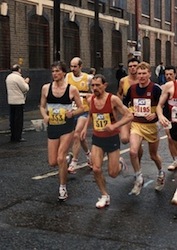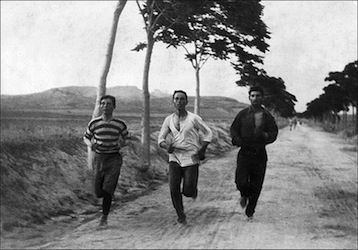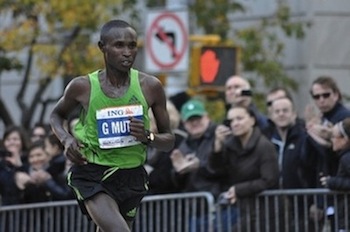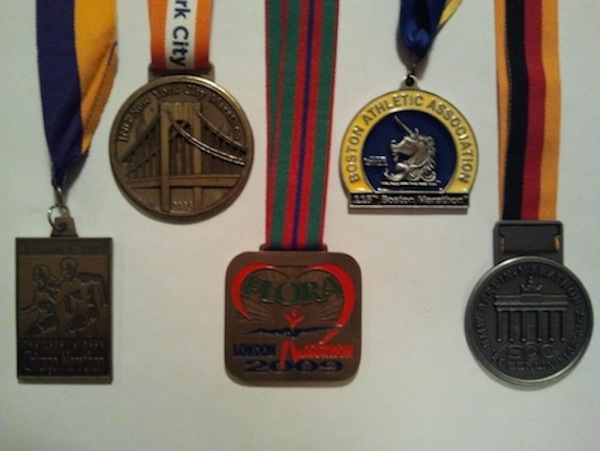World records were not officially recognized by the IAAF until 1 January 2004; previously, the best times for the marathon were referred to as the 'world best'.
Courses must conform to IAAF standards for a record to be recognized. However, marathon routes still vary greatly in elevation, course, and surface, making exact comparisons impossible.
Typically, the fastest times are set over relatively flat courses near sea level, during good weather conditions and with the assistance of pacesetters. The current world record time
for men over the distance is 2 hours 3 minutes and 38 seconds, set in the Berlin Marathon by Patrick Makau of Kenya on 25 September 2011, an improvement of 21 seconds over
the previous record also set in the Berlin Marathon by Haile Gebrselassie of Ethiopia on 28 September 2008. The world record for women was set by Paula Radcliffe of Great Britain
in the London Marathon on 13 April 2003, in 2 hours 15 minutes and 25 seconds.
On 18 April 2011, Geoffrey Mutai of Kenya ran the fastest marathon ever in a time of 2 hours 3 minutes 2 seconds at the 2011 Boston Marathon, but the mark will not be recognized
as a world record since the Boston course fails the IAAF criteria for world record eligibility.
 The marathon is a long-distance running event with an official distance of 42.195 kilometres (26 miles and 385 yards),
that is usually run as a road race. The event was instituted in commemoration of the fabled run of the Greek soldier Pheidippides,
a messenger from the Battle of Marathon (the namesake of the race) to Athens. The marathon was one of the original modern Olympic events in 1896,
though the distance did not become standardized until 1921. More than 500 marathons are held throughout the world each year,
with the vast majority of competitors being recreational athletes. Smaller marathons, such as the Stanley Marathon,
can have just dozens of participants, while larger marathons can have tens of thousands of participants.
The marathon is a long-distance running event with an official distance of 42.195 kilometres (26 miles and 385 yards),
that is usually run as a road race. The event was instituted in commemoration of the fabled run of the Greek soldier Pheidippides,
a messenger from the Battle of Marathon (the namesake of the race) to Athens. The marathon was one of the original modern Olympic events in 1896,
though the distance did not become standardized until 1921. More than 500 marathons are held throughout the world each year,
with the vast majority of competitors being recreational athletes. Smaller marathons, such as the Stanley Marathon,
can have just dozens of participants, while larger marathons can have tens of thousands of participants. The name Marathon comes from the legend of Pheidippides, a Greek messenger. The legend states that he was sent from the
battlefield of Marathon to Athens to announce that the Persians had been defeated in the Battle of Marathon (in which he had just fought),
which took place in August or September 490 BC. It is said that he ran the entire distance without stopping and burst into the assembly,
exclaiming "nikomen", (We have won), before collapsing and dying. The account of the run from Marathon to Athens first appears in
Plutarch's On the Glory of Athens in the 1st century AD which quotes from Heraclides Ponticus's lost work, giving the runner's name as either
Thersipus of Erchius or Eucles. Lucian of Samosata (2nd century AD) also gives the story but names the runner Philippides.
The name Marathon comes from the legend of Pheidippides, a Greek messenger. The legend states that he was sent from the
battlefield of Marathon to Athens to announce that the Persians had been defeated in the Battle of Marathon (in which he had just fought),
which took place in August or September 490 BC. It is said that he ran the entire distance without stopping and burst into the assembly,
exclaiming "nikomen", (We have won), before collapsing and dying. The account of the run from Marathon to Athens first appears in
Plutarch's On the Glory of Athens in the 1st century AD which quotes from Heraclides Ponticus's lost work, giving the runner's name as either
Thersipus of Erchius or Eucles. Lucian of Samosata (2nd century AD) also gives the story but names the runner Philippides. When the idea of a modern Olympics became a reality at the end of the 19th century, the initiators and organizers were looking for a great popularizing event,
recalling the ancient glory of Greece. The idea of organizing a marathon race came from Michel Breal, who wanted the event to feature
in the first modern Olympic Games in 1896 in Athens. This idea was heavily supported by Pierre de Coubertin, the founder of the modern Olympics,
as well as the Greeks. The Greeks staged a selection race for the Olympic marathon on 10 March 1896 that was won by Charilaos Vasilakos in 3 hours and 18 minutes
(with the future winner of the introductory Olympic Games marathon coming in fifth). The winner of the first Olympic Marathon, on 10 April 1896 (a male-only race),
was Spyridon "Spyros" Louis, a Greek water-carrier. He won at the Olympics in 2 hours 58 minutes and 50 seconds.
When the idea of a modern Olympics became a reality at the end of the 19th century, the initiators and organizers were looking for a great popularizing event,
recalling the ancient glory of Greece. The idea of organizing a marathon race came from Michel Breal, who wanted the event to feature
in the first modern Olympic Games in 1896 in Athens. This idea was heavily supported by Pierre de Coubertin, the founder of the modern Olympics,
as well as the Greeks. The Greeks staged a selection race for the Olympic marathon on 10 March 1896 that was won by Charilaos Vasilakos in 3 hours and 18 minutes
(with the future winner of the introductory Olympic Games marathon coming in fifth). The winner of the first Olympic Marathon, on 10 April 1896 (a male-only race),
was Spyridon "Spyros" Louis, a Greek water-carrier. He won at the Olympics in 2 hours 58 minutes and 50 seconds. Long after the re-establishment of the marathon in the Olympics, distance races such as the marathon did not include female participants.
Although a few women had run the marathon distance, they were not included in any official results. Marie-Louise Ledru has been credited as the first woman to race a marathon.
Violet Piercy has been credited as the first woman to be officially timed in a marathon. For challenging the long-held tradition of all-male marathon running in the Boston Marathon,
in 1967, Kathrine Switzer is regarded as the first woman to run a marathon as a numbered entry, but did so unofficially, due to a fluke in the entry process.
Bobbi Gibb had completed the Boston race unofficially the previous year, and was later recognized by the race organizers as the women's winner for that year,
as well as 1967 and 1968.
Long after the re-establishment of the marathon in the Olympics, distance races such as the marathon did not include female participants.
Although a few women had run the marathon distance, they were not included in any official results. Marie-Louise Ledru has been credited as the first woman to race a marathon.
Violet Piercy has been credited as the first woman to be officially timed in a marathon. For challenging the long-held tradition of all-male marathon running in the Boston Marathon,
in 1967, Kathrine Switzer is regarded as the first woman to run a marathon as a numbered entry, but did so unofficially, due to a fluke in the entry process.
Bobbi Gibb had completed the Boston race unofficially the previous year, and was later recognized by the race organizers as the women's winner for that year,
as well as 1967 and 1968. World records were not officially recognized by the IAAF until 1 January 2004; previously, the best times for the marathon were referred to as the 'world best'.
Courses must conform to IAAF standards for a record to be recognized. However, marathon routes still vary greatly in elevation, course, and surface, making exact comparisons impossible.
Typically, the fastest times are set over relatively flat courses near sea level, during good weather conditions and with the assistance of pacesetters. The current world record time
for men over the distance is 2 hours 3 minutes and 38 seconds, set in the Berlin Marathon by Patrick Makau of Kenya on 25 September 2011, an improvement of 21 seconds over
the previous record also set in the Berlin Marathon by Haile Gebrselassie of Ethiopia on 28 September 2008. The world record for women was set by Paula Radcliffe of Great Britain
in the London Marathon on 13 April 2003, in 2 hours 15 minutes and 25 seconds.
World records were not officially recognized by the IAAF until 1 January 2004; previously, the best times for the marathon were referred to as the 'world best'.
Courses must conform to IAAF standards for a record to be recognized. However, marathon routes still vary greatly in elevation, course, and surface, making exact comparisons impossible.
Typically, the fastest times are set over relatively flat courses near sea level, during good weather conditions and with the assistance of pacesetters. The current world record time
for men over the distance is 2 hours 3 minutes and 38 seconds, set in the Berlin Marathon by Patrick Makau of Kenya on 25 September 2011, an improvement of 21 seconds over
the previous record also set in the Berlin Marathon by Haile Gebrselassie of Ethiopia on 28 September 2008. The world record for women was set by Paula Radcliffe of Great Britain
in the London Marathon on 13 April 2003, in 2 hours 15 minutes and 25 seconds.
